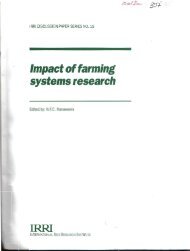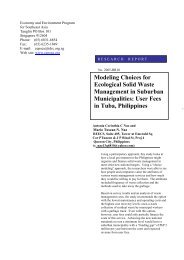Foreword - IDL-BNC @ IDRC - International Development Research ...
Foreword - IDL-BNC @ IDRC - International Development Research ...
Foreword - IDL-BNC @ IDRC - International Development Research ...
You also want an ePaper? Increase the reach of your titles
YUMPU automatically turns print PDFs into web optimized ePapers that Google loves.
50 F.A. Orozco and D.C. Cole<br />
the action-research process as a whole was carried out at the end of the project.<br />
It used self-evaluation questionnaires completed by participants in the potato<br />
platforms and cross-sector groups, and was complemented by in-depth interviews<br />
with these participants and additional actors connected to Ecosalud II.<br />
Interventions<br />
Work with the potato platforms was essential to mobilize human and modest<br />
fi nancial resources to extend Ecosalud II’s interventions to different settings. In<br />
keeping with community-based research models (Viswanathan et al. 2004 ) ,<br />
interventions were developed at multiple levels that corresponded to the key<br />
actors’ mandate or scope (community, municipal, and provincial) (Orozco and<br />
Cole 2006 ) .<br />
At the community level, numerous fi eld schools and fi eld days were held for<br />
farmers to allow them to share their understanding of ecosystems and their experiences<br />
with traditional and new agricultural practices, including reducing highly<br />
hazardous pesticide use. Other interventions included community theatre, healthpromotion<br />
groups, and puppet shows preformed at schools, during which questions<br />
were raised about current agricultural production, its impacts on health, and<br />
the reasons for pesticide use. Efforts were made to develop joint responses<br />
to changing practices, in keeping with “radical” approaches to health education<br />
(Oliveira 2005 ) .<br />
At the municipal level, ordinances were jointly drafted by the research team<br />
and local policymakers to promote local policies on training and agricultural<br />
extension related to alternative crop-management practices (Orozco and Cole<br />
2008 ) . As an off-shoot of the project, a farmers’ organization teamed up with a<br />
municipality to obtain NGO support to set up a local store to sell less hazardous<br />
products and provide information on integrated pest management. The store has<br />
developed into a Centre for Agriculture and Livestock Services (Coagro-Q), which<br />
is led by farmers’ organizations and has farmers as the main partners along with<br />
the municipality and nongovernmental organizations. Currently, more than 300<br />
farmers are involved in some way with the Centre – seeking advice, purchasing<br />
products, receiving training in healthy and sustainable agriculture, or providing<br />
consultation to other farmers.<br />
At the provincial level, Ecosalud II assisted Ministry of Health staff with peer-topeer<br />
interchanges. For example, an emergency physician from Carchi came to<br />
Chimborazo’s regional hospital and trained emergency and health centre staff in the<br />
diagnosis and treatment of pesticide poisonings using protocols jointly developed<br />
with Ecosalud II. To bolster surveillance for acute pesticide-related poisonings,<br />
reporting forms and a jointly developed health-information system were shared, and<br />
epidemiology staff in each province were trained, with the assistance of a Canadian<br />
epidemiology student.

















